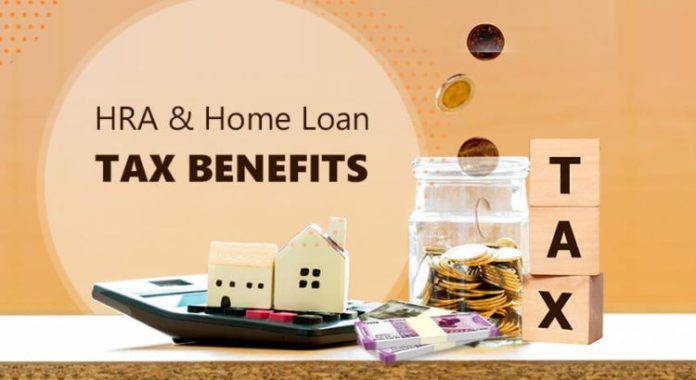Smart taxpayers file and pay their taxes on time and know various ways to save money on taxes. The Indian government provides several tax exemptions and deductions to help people save taxes. However, only some people are aware of them. For instance, many individuals either claim an income tax deduction on Home Loan interest payment or House Rent Allowance (HRA), but they don’t know that they can claim both if they satisfy certain conditions.
Homeowners who get HRA as their salary component and pay back a home loan can take advantage of both of these tax benefits to reduce their taxable income. Many employees ask, “Can I claim HRA and interest on a housing loan?” We have discussed the answer in this article.
House Rent Allowance
HRA is a salary component many salaried taxpayers receive to bear rental payments for their hired premises. However, the HRA allowance becomes fully taxable if the individual does not live in a rented house or pay rent. Section 10(13A) of the Income-Tax Act, 1961 exempts it from a taxpayer’s taxable salary under several conditions. HRA exemption is applicable under the following conditions:
- The taxpayer should be a salaried employee.
- The taxpayer should receive HRA as a part of their salary.
- The taxpayer should reside in a rented house and pay rent.
- The taxpayer should provide a rental agreement or rent receipts as proof of rent to claim the exemption.
- If the rent is more than ₹ 1 Lakh per annum, the taxpayer should declare the landlord’s PAN to their employer.
The HRA exemption amount available in a financial year should be at least the actual HRA received, or 40% of the basic salary, 50% for a rented house in a metro city, or rent paid less than 10% of the basic salary.
Tax Benefit on Home Loan Interest Payment
Home Loan EMI comprise principal and interest payments. Under Section 24(B) of the IT Act 1961, taxpayers can claim a deduction of up to ₹ 2 Lakh on the interest component in a year. A Home Loan interest rate calculator helps calculate the interest cost and claim the applicable deduction.
Claiming Both Tax Benefits Together
Simply put, taxpayers cannot claim an HRA exemption if they own a house and claim a tax deduction on the home loan interest payments. However, if a homeowner is paying a Home Loan and receiving HRA in their salary, they can obtain both benefits under the following four scenarios:
1. Own a home in one city but lives in another town on rent
If a taxpayer has purchased a house in one city but lives in another on rent, they can claim tax deductions on both HRA exemption and home loan tax benefits.
2. Own a home in one city but lives in the same town on rent
There might be situations when a person owns a house in one town but lives in another house on rent in the same city due to location, commute, or other reasons. In that case, they can claim both HRA and Home Loan tax benefits if they provide genuine reasons for doing so.
3. Rents out own house and lives in a rented house in the same city
Some taxpayers rent out their own homes and live in a rented house elsewhere for reasons like proximity to children’s school or workplace, medical treatment, or another genuine reason. In that case, they can claim tax benefits on all Home Loan interest payments and HRA exemptions but not principal repayment.
4. Own a house under construction and lives in a rented house elsewhere
A taxpayer might have obtained a home loan that is under construction. Until the construction is complete, they may live in a rented house elsewhere within the same city. In such a situation, they can claim an HRA exemption and all other tax deductions related to the home loan under Section 24(B). However, the Home Loan interest deduction is applicable only after the property’s complete construction in five instalments.
Conclusion
A salaried employee receiving house rent allowance (HRA) as part of their salary and paying EMIs towards their home loan can avail themselves of the benefits of both HRA exemption and home loan interest or principal repayment deduction. However, they should fulfil the conditions mentioned in this article to receive the benefits. If the income tax officer picks up the taxpayer’s case later for scrutiny, they should be prepared to substantiate these deductions if questioned.
Must Read: Reasons Why a Good CIBIL Score Is Essential While Applying for a Home Loan











